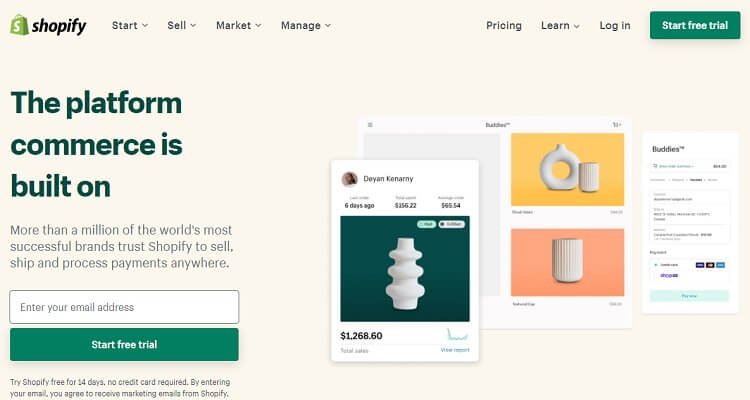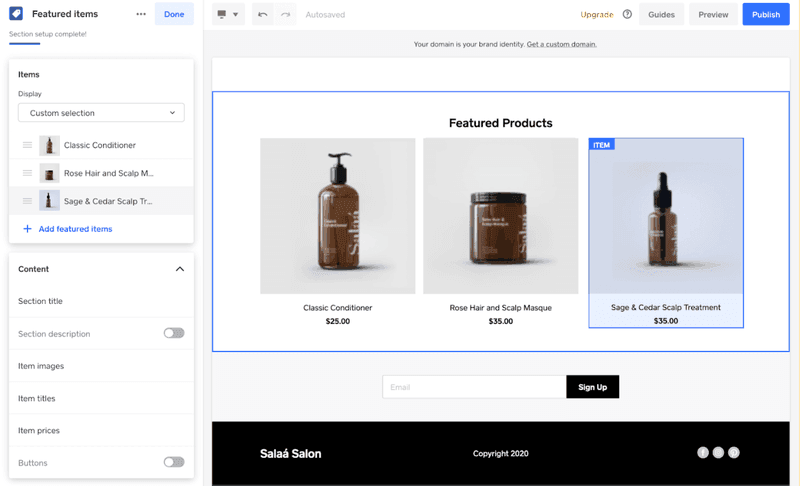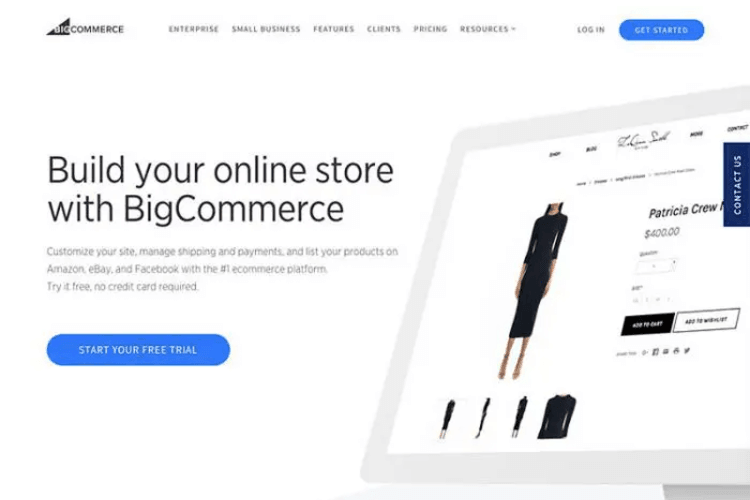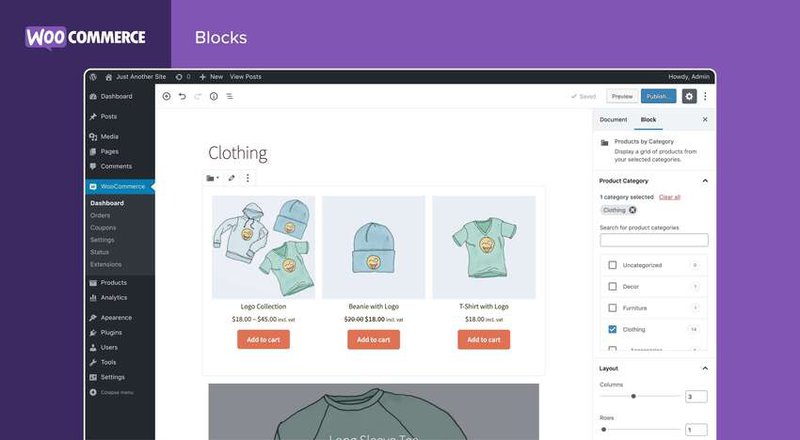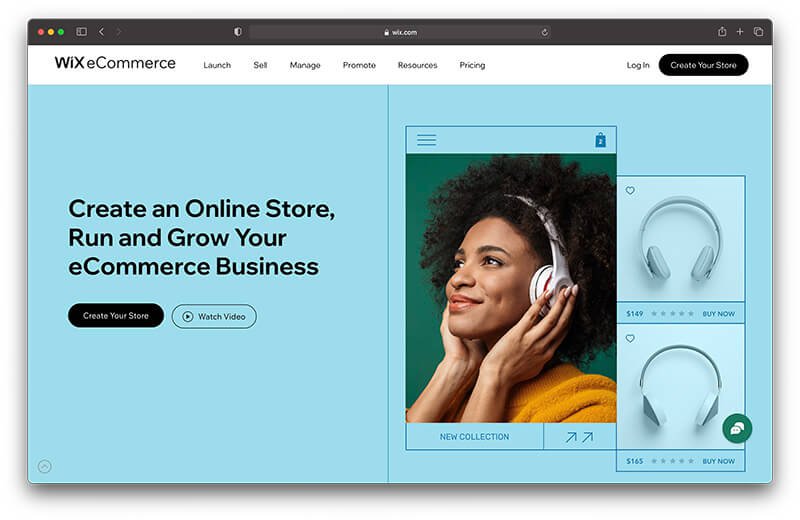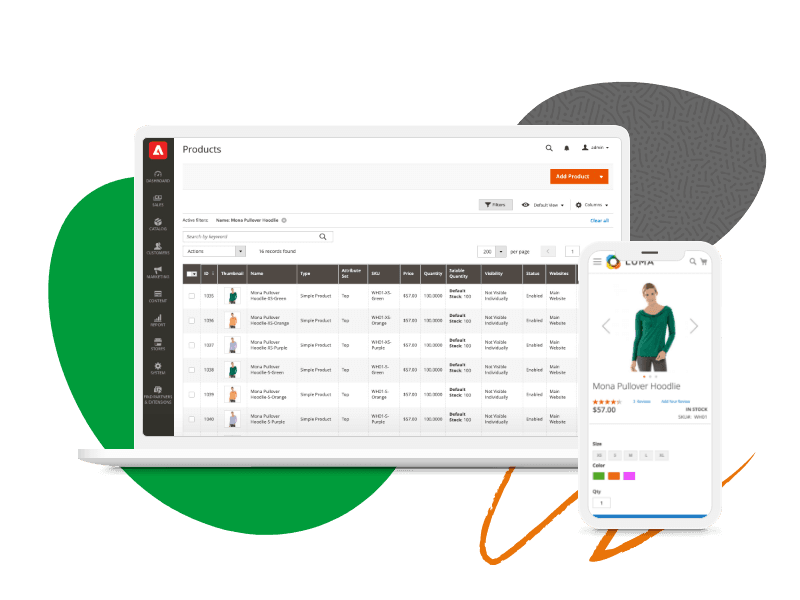7 Best eCommerce Platforms to Build and Grow your Online Store
The comprehensive guide to the most powerful eCommerce platforms out there. Find out which one has the best templates, apps, integrations, and sales channels.
Updated November 6, 2024.
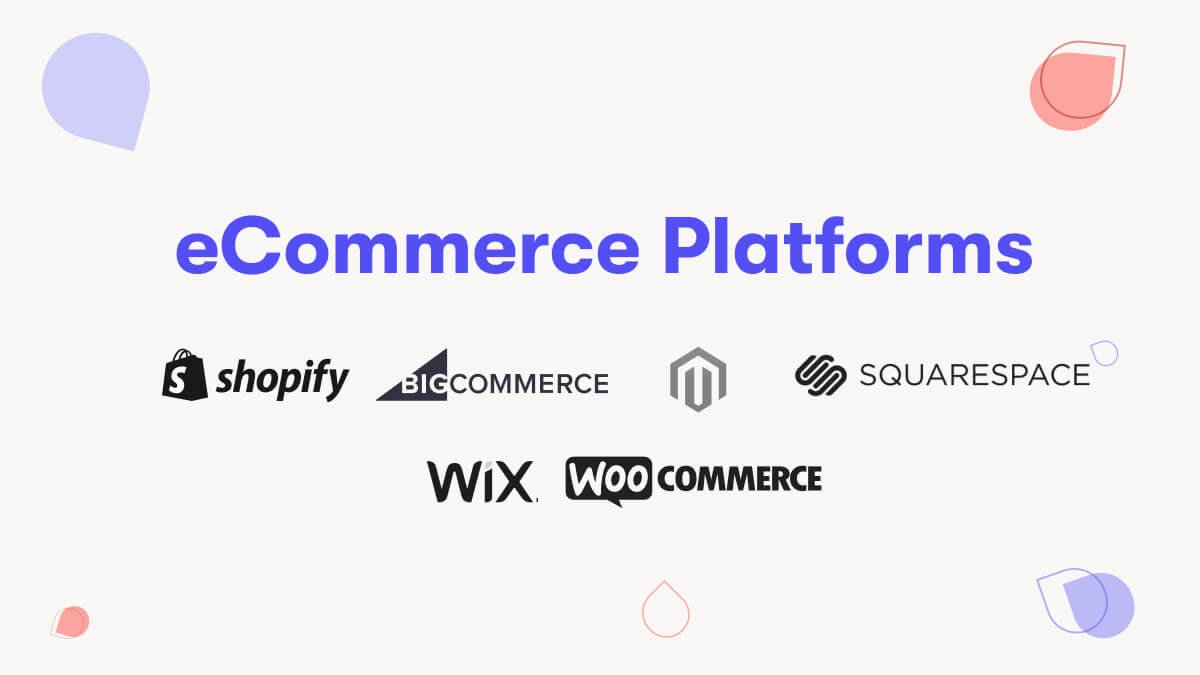
Picking the right eCommerce platform is one of the biggest decisions eCommerce businesses make. Most platforms come packed with advanced marketing features and eCommerce integrations that are absolutely vital for online stores. Before you ever hire a freelancer or an eCommerce marketing agency you should first make sure you have all the right apps, integrations, and sales channels set up on your platform.
Want to launch a successful business? Looking for the perfect eCommerce platform? Don’t fret, we’ve got you covered. Here’s a list of the most powerful eCommerce platforms to check out for your online business.
What is an eCommerce platform?
An eCommerce platform is a software application that lets sellers build and host an online store and helps buyers find physical and digital products online. Ecommerce platforms usually come with plugins and integrations, a streamlined checkout experience, optimized shopping cart features, and drag-and-drop functionality.
Things to consider when choosing your eCommerce platform
There are several factors you should consider when choosing the best eCommerce platform for your online store.
Budget
Let's talk about the bottom line. Hosting your own site and adding a little cart plugin to it may be cost-effective but may not offer you the functionality you need as your store grows. You should look at the payment gateways and the various fees that each platform charges.
For example, Shopify charges a transaction fee of 2.9% + $0.30 per transaction for its basic plan. You may get a lower fee if you choose not to use Shopify payments and go with a different payment gateway. BigCommerce doesn't charge a transaction fee, and only has a standard monthly or annual fee depending on the plan you choose.
The best thing you can do for your online business is to find an eCommerce platform that has all the various features and integrations you need all included in their plan. These could include things like an online store builder, the ability to take online payments, SEO optimization, tools for marketing campaigns, emails with responsive design, attractive templates, and other design functionalities. (Read here on ecommerce email marketing agencies)
And if you want to save some additional money you could always sign up for the annual plans of your platform.
Web design
Next, let’s talk about the design of your online store. Some platforms have customizable templates you could use to make your store look glamorous while others may require some custom coding. Advanced users may naturally gravitate towards the more customizable platforms like WooCommerce rather than using standard ones like Wix or Squarespace.
Integrations
If you're a growing eCommerce business chances are you have a wide range of marketing tools and platforms that you need to integrate with your online store. Here’s a short list of integrations you might need:
- Sales channels (Google Shopping, eBay, Amazon)
- Online payments (Apple Pay, Paypal, Google Pay)
- Social media integrations
- Customer reviews
- Google Analytics
- Discount codes
- SEO optimization
- Promotions
- Upsales
- Email marketing tools
- Multi-channel integrations
- Bundle tools to sell products in bulk
You don’t want to get started on a platform only to find out that it doesn’t have the additional features you need for your store. So look through the available apps and make sure the platform has what you need, before you get started.
Pro tip: Looking for the right tool? check out our guide to the best email tools for eCommerce.
Hosting
The nice thing about eCommerce platforms like Shopify or BigCommerce is that everything is hosted on the cloud. You could always save some money and use a self-hosted platform like WooCommerce, but then all the other features come at an additional cost. Hosting can cost an additional $70-$300 per year, depending on the amount of traffic you have and the bandwidth you need.
Maintenance
Look at the maintenance costs associated with your site. You may need to renew your domain name every year, pay for hosting (unless your platform has it included), renew your SSL certificate, and pay your annual app fees.
Customer service
You also have to look at the customer support options of each platform. Some eCommerce platforms offer 24/7 support via email, phone, and live chat, while others’ support options are pretty limited. Make sure the platform you choose has the right customer service reps available to help you troubleshoot features and improve your store performance.
The best eCommerce platforms for 2022
There are several really great platforms that you can use to build your eCommerce store and then manage it. Each has its advantages and disadvantages, and your ideal choice should vary based on your needs.
Shopify
Shopify is the most popular platform for eCommerce sites. It’s great for getting up and running quickly, has a 14-day free trial, and is really easy to use. There are ten free themes and over 50 paid themes that start at $140.
You can also find more than 1,200 themes on ThemeForest for $50 each. There are hundreds of Shopify apps you can use to improve your eCommerce marketing, fulfillment, analytics, and much more. There are also hundreds of Shopify marketing agencies that can help you scale channels and grow your sales.
One of the drawbacks of Shopify is that it’s limited to 100 product variants, so not enough if you have a lot of different product combinations. Also, you can’t customize the checkout process unless you pay extra and get on the Shopify Plus plan. But if you’re not a huge eCommerce business, then Shopify is a solid choice.
Another added benefit of using Shopify is that advanced users can use Shopify’s open-source liquid language to create their own eCommerce templates and add custom code to their site.
They also recently launched a number of Shopify marketing features and built-in tools, such as Shopify email and Shopify Inbox, which help streamline customer service and automate campaigns.
Want to learn how to scale your Shopify sales? Check out our top eCommerce experts and Shopify agencies to hire this year.
Key features:
- Unlimited products
- Sales channels
- Customer segmentation
- Marketing automation
- Abandoned cart emails
- 77%-88% shipping discounts
- Shopify point of sale
Pricing plans:
Shopify has monthly plans that start at $29 per month and go up from there. It also has a 14-day free trial and a Starter Plan for stores that want to sell via social and messaging apps for only $5 per month.
Square
Square is great for selling both online and in-person. If you want to sell at a marketplace, a fair, or a festival then this is the best option for you. It has a really simple website builder with no monthly fees. You only pay when you make a sale. You can also get a Square credit card reader or a virtual terminal, which acts just like a digital cash register.
Like other platforms, Square’s free plan includes ads so if you want to remove those and use your own custom domain then upgrade to one of the advanced plans.
Key features:
- Unlimited products
- Afterpay + Google Pay + Apple Pay
- In-store & curbside pickup
- Gift cards & discount codes
- Basic marketing and SEO tools
Pricing plans: Square offers a free plan for unlimited products and some of its basic features. Paid pricing plans start at $12 per month.
BigCommerce
BigCommerce is an excellent choice for large-volume sellers. It’s a robust platform that has no transaction fees so you only pay a monthly fee to set up your store. It integrates with all the main marketplaces like Amazon, eBay, and Facebook and all the popular payment processors like Stripe, PayPal, Braintree, and Amazon.
It also has a drag-and-drop eCommerce website builder that helps you customize your store, with no coding necessary.
Key features:
- Single-page checkout process
- Headless commerce (ability to run multiple stores with one platform)
- Abandoned cart recovery
- Checkout process customization
- Zero transaction fees
Pricing plans: BigCommerce has a 15-day free trial for all the basic plans, paid plans start at $25.95 per month.
WooCommerce
WooCommerce is a WordPress plugin that helps you transform your WordPress site into an eCommerce store. It’s a simple plugin that you install on your site and it allows you to have all the features that the big eCommerce platforms provide. WooCommerce has a ton of extensions (similar to other platforms) and it integrates with Zapier for even more functionality and flexibility.
The unique thing about WooCommerce is that it’s an open-source platform. So it gives you complete control over what you want your online store to look like. It is absolutely free, there’s no cost to install it and no transaction fees (beyond the ones you pay to the payment providers). It has all the various channel integrations (like Google Shopping), and has a drag-and-drop eCommerce website builder.
One disadvantage of WooCommerce is that merchants are responsible for their own PCI compliance.
Key features:
- Marketing integrations + point of sale systems
- Flexible product settings (subscriptions, digital downloads, bundles)
- Drag-and-drop eCommerce website builder
- Wide range of payment options (Google Pay, Paypal, Apple Pay)
Pricing plans: free, no annual plans, subscription, or transaction fees.
Wix
Wix is a solid choice for eCommerce owners that are looking for something that’s really easy to use. It’s simple, it has a ton of great templates, and lets you set up your site in minutes. It’s also one of the cheaper options with prices starting at only $23/mo and no transaction fees.
The Wix eCommerce plan lets you sell on social media platforms, integrate dropshipping, and source and sell products directly on your store.
Key features:
- Free custom domain name for 1 year
- Unlimited products
- Product reviews
- Loyalty programs
- Multiple currencies
Pricing plans: Wix eCommerce plans start at $23 per month.
Squarespace
Squarespace is another great option. It’s a very easy website builder that has a great inventory system, powerful analytics tools, and great integrations to all the various social media channels. It has a more limited collection of website templates but it is cheaper than all the other paid platforms, with prices starting at $18/mo.
The only disadvantage with these simpler platforms (Wix or Squarespace) is that they make it harder to scale your eCommerce store and do not have all of the social media integrations, marketing features (coupon codes, customer reviews), and payment options that you may need. So if you see yourself having a lot of products and expanding in the near future you should go with a robust platform like Shopify or BigCommerce.
Key features:
- Unlimited bandwidth
- SSL security
- Basic SEO features
- eCommerce templates
- Advanced website analytics
- Popups and banners
- Video maker
- Unlimited product listings
- Free custom domain (for 1 year)
- 24/7 customer service
Pricing plans: the personal plan starts at $23 per month and includes all the basic features of the platform.
Adobe Commerce (previously Magento)
Magento was one of the most popular eCommerce platforms and was then bought by Adobe and renamed Adobe Commerce. Combined with Adobe’s powerful features and a suite of products it’s now one of the most powerful eCommerce platforms for large businesses and enterprises.
Key features:
- Drag and drop page builder
- Content personalization for customer segments
- Multi-channel commerce
- Personalized recommendations
- Advanced inventory management
- Advanced store customization & analytics
Pricing plans: Adobe Commerce is around $1,800 per month and only has annual plans.
Takeaways
When you're choosing the best eCommerce platform to use for your online store you have to consider your budget, your goals, the features you need, payment gateways, hosting, maintenance, integrations, and the kind of customer service you require to run your store.
You also have to make sure that your platform natively integrates with some of the marketing channels you’re using such as Google Ads, Facebook Ads, Amazon, eBay, etc., and has the marketing apps you need for SEO and conversion rate optimization.
Overall, the top platforms on our list are - Shopify, Bigcommerce, and Square. Otherwise, if you want an open-source platform that gives you full control over how your store looks you should go with WooCommerce.
FAQs
What is the most used eCommerce platform?
Shopify is the most popular eCommerce platform, with over 1 million merchants. It is the most popular in the English-speaking world and is perfect for a variety of artists and industries. Magento (now Adobe Commerce) is the second most-used with 250,000 merchants and BigCommerce comes in third place with 60,000 active users. Runner-ups are BigCommerce, WooCommerce, and Wix. For B2B or large eCommerce enterprises, a popular option is the Salesforce Commerce Cloud.
Which platform is best for eCommerce?
BigCommerce and Shopify are the best platforms for eCommerce. Shopify is best for making your first million in revenue while BigCommerce is a bit more user-friendly and has the more advanced commerce features you need as you grow. Other powerful eCommerce platforms include Wix, Squarespace, Zyro, Salesforce Commerce Cloud, and Magento (now called Adobe Commerce).
What are the 7 major online platforms?
Here are the seven most popular social media platforms on the internet:
- Facebook — 2.9 billion monthly active users
- YouTube — 2.2 billion monthly active users
- WhatsApp — 2 billion monthly active users
- Instagram — 2 billion monthly active users
- WeChat — 1.26 billion monthly active users
- TikTok — 1 billion monthly active users
- Sina Weibo — 573 million monthly active users
- QQ — 538.91 million monthly active users
Do I need an eCommerce platform?
Yes, you definitely need to use an eCommerce platform to sell physical products online. The only other option is to build your own from scratch and most companies can't afford the tens of thousands of dollars it would cost to build one that has all the eCommerce functionality they need.
Is Amazon an eCommerce platform?
Amazon was founded in 1994 and has since become one of the biggest eCommerce platforms on the planet. You can buy anything on it from cleaning products to books to digital products or digital downloads. Amazon lets merchants host a store and upload their products.
Which is best Shopify or WordPress?
It depends on the kind of online business you’re running. If your business is completely focused on eCommerce then Shopify is definitely the better option. If you are selling a combination of digital products (digital downloads) and physical products then WordPress may be a better option. For WordPress, you should use WooCommerce to get the eCommerce functionality and creative control over your store.
Is Shopify better than WooCommerce?
Shopify has better eCommerce features than WooCommerce and all of them are built-in. With WooCommerce, you have to go out and look for apps to integrate, you’re responsible for your checkout PCI compliance, and everything comes at an additional cost.
With Shopify, a lot of the basic features are built-in, and you have the Shopify app store for Shopify and Shopify Plus stores (that’s Shopify’s advanced plan). Shopify is the most well-known platform in the eCommerce space and for good reason, they offer everything you will ever need for your eCommerce store.
